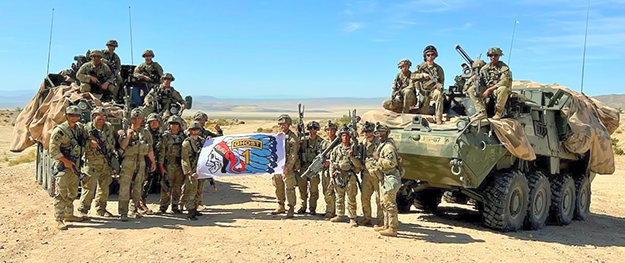Col. Kwenton Kuhlman's command of 1st Brigade, 2nd Stryker Brigade Combat Team, 7th Infantry Division was one of servant leadership. On July 11, on Watkins Field, he relinquished that command to Col. Christopher Nunn.
"The soldiers of this brigade are trained, and they are ready," said Maj. Gen. Michelle Schmidt, Commanding General, 7th Infantry Division. "Kwenton, this was your mission ... and you succeeded. Your focus on grit, competence and continuous learning paid off."
During his tenure as commander of the "Ghost" Brigade, Kuhlman focused on building good leaders by listening to and working with them as he oversaw the modernization and training of the brigade to be ready to deploy.
During a previous interview Kuhlman talked about a quote that in the American soldier this nation's allies have no greater friend, and that our nation's enemies have no greater adversary. He added that in order for this dynamic to exist, there must be trust and integrity, created by a rigorous training regime whereby it is demonstrated that every soldier is competent.
"A subordinate leader knows that I have trust and confidence because we train to a very high level, as we demonstrated during our recent rotation to the National Training Center," continued Kuhlman. "We are really good at what we do, and we will give our enemies multiple dilemmas; we are prepared to fight and win."
But underlying all of his efforts to build leaders and make The Ghost Brigade into the nation's First Stryker Brigade Combat Team, Kuhlman consistently stressed that it was all about the soldiers and not him.
"This is not about me," he continued, "it's about the soldiers standing before me."
Kuhlman related how he met and learned from Spc. Anas Abdul Razzaq, an immigrant from Iraq who exceled at ensuring the communications equipment on the Strykers and in the command center was ready and maintained to go during training at NTC; or how Maj. Matt Francis hiked two miles through the rain and cold with his physical therapy table on his back to provide fellow soldiers with physical therapy during training at Joint Base Lewis-McChord; or when Maj. Graham Warner volunteered to stay longer during a training exercise at the Yakima Training Center in order that another soldier could respond to a family crisis.
"I tell you this because they are examples of why I love being in the Army, because we are surrounded by people like that," said Kuhlman. "They are selfless, truly selfless."
In talking about the selflessness of his soldiers, it was pointed out to him that it perhaps takes a selfless person to know a selfless person, and that he is selfless as a leader.
He just smiled.





Read Comments